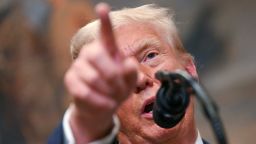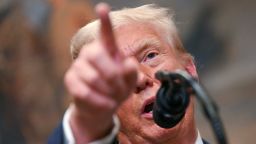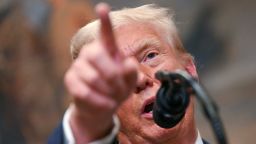Education
Trump Responds to Russian Threats with Nuclear Submarine Orders

President Donald Trump has responded to recent comments from former Russian President Dmitry Medvedev by ordering the repositioning of two U.S. nuclear submarines. This move appears to be a reaction to Medvedev’s inflammatory statements regarding the ongoing conflict in Ukraine and the United States’ stance on Russia.
Medvedev, who has positioned himself as a vocal critic of the West, condemned Trump’s deadline for a peace deal in Ukraine. He described the ultimatum as a “step towards war,” suggesting that such rhetoric could lead to conflict not only between Ukraine and Russia but also within the United States itself. In a particularly provocative comment, he referenced Russia’s automated nuclear retaliation system, known as the “Dead Hand,” warning of its potential dangers.
Despite the gravity of the situation, Marco Rubio, Trump’s Secretary of State, downplayed Medvedev’s comments, noting that the former president no longer holds significant political power in Russia. Many in Russia view Medvedev as politically irrelevant, raising questions about why Trump would choose to engage with his statements. Critics suggest that this interaction allows Trump to project a tough image towards Russia without directly confronting the actual decision-maker in the Kremlin, President Vladimir Putin.
Trump characterized his order for the submarines to be “positioned in the appropriate regions” as a precaution against Medvedev’s “foolish and inflammatory statements.” However, experts point out that numerous U.S. nuclear submarines are already active in global waters, each equipped with hundreds of nuclear warheads. Given the extensive range of these missiles, any repositioning is unlikely to significantly alter their operational capabilities against Russian targets.
The timing of Trump’s response coincides with upcoming talks between U.S. envoy Steve Witkoff and Russian leadership. Witkoff is expected to push for a ceasefire as a deadline set by Trump for a peace agreement approaches. There is skepticism about whether the Kremlin will agree to any terms, as it has consistently insisted on achieving its military objectives in Ukraine before considering a resolution.
While the escalation of nuclear rhetoric may be alarming, analysts caution that it does not indicate an imminent nuclear confrontation. The current dynamics between Washington and Moscow, though strained, remain far from the brink of war. Nevertheless, the heightened discourse surrounding nuclear readiness may serve as a distraction for Trump from pressing domestic issues, such as political controversies and investigations.
In summary, Trump’s reaction to Medvedev’s statements illustrates the complexities of U.S.-Russia relations and highlights the challenges of navigating diplomatic tensions. As the situation evolves, the focus remains on the potential for dialogue and the implications of military posturing on both sides.
-

 Lifestyle2 weeks ago
Lifestyle2 weeks agoBelton Family Reunites After Daughter Survives Hill Country Floods
-

 Technology2 weeks ago
Technology2 weeks agoDiscover the Top 10 Calorie Counting Apps of 2025
-

 Education3 weeks ago
Education3 weeks agoWinter Park School’s Grade Drops to C, Parents Express Concerns
-

 Technology3 weeks ago
Technology3 weeks agoByteDance Ventures into Mixed Reality with New Headset Development
-

 Technology3 weeks ago
Technology3 weeks agoMeta Initiates $60B AI Data Center Expansion, Starting in Ohio
-

 Technology5 days ago
Technology5 days agoHarmonic Launches AI Chatbot App to Transform Mathematical Reasoning
-

 Technology2 weeks ago
Technology2 weeks agoMathieu van der Poel Withdraws from Tour de France Due to Pneumonia
-

 Lifestyle3 weeks ago
Lifestyle3 weeks agoNew Restaurants Transform Minneapolis Dining Scene with Music and Flavor
-

 Technology3 weeks ago
Technology3 weeks agoRecovering a Suspended TikTok Account: A Step-by-Step Guide
-

 Technology3 weeks ago
Technology3 weeks agoGlobal Market for Air Quality Technologies to Hit $419 Billion by 2033
-

 Health3 weeks ago
Health3 weeks agoSudden Vision Loss: Warning Signs of Stroke and Dietary Solutions
-

 Technology3 weeks ago
Technology3 weeks agoTrump Faces Internal Struggles Over Epstein Files Handling


















